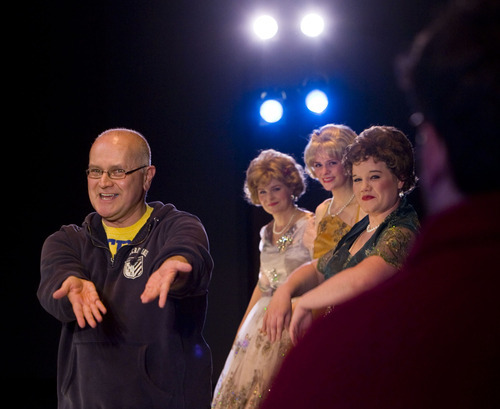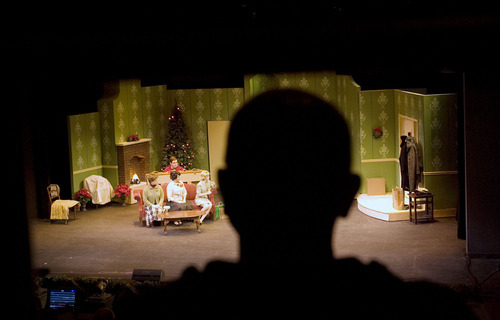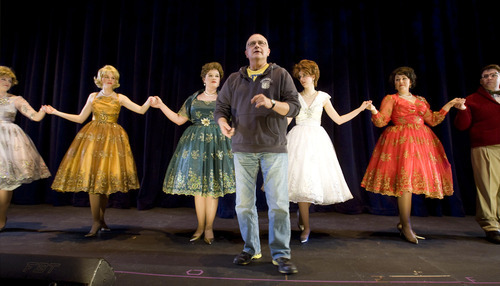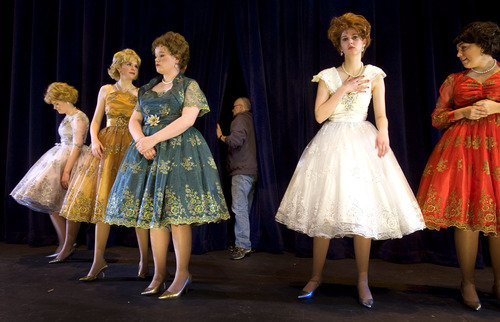This is an archived article that was published on sltrib.com in 2010, and information in the article may be outdated. It is provided only for personal research purposes and may not be reprinted.
Jim Christian is a director and a teacher, and in his view, there's not much difference between the two roles.
"They overlap constantly," said Christian, the award-winning director/playwright who directs Weber State University's musical theater program.
Borrowing the philosophy of a friend, Christian advises young actors that "going to rehearsal is like going to class."
Of course, going to one of Christian's classes isn't exactly a chore. Comments on http://www.ratemyprofessor.com include liberal use of words like "awesome," "amazing" and "fabulous."
"He was a great teacher," said Dustin Bolt, a Weber grad who just completed a run in Salt Lake Acting Company's "When You Give a Mouse a Cookie." "When I got to Weber State [as a junior transfer], I kicked myself for not going there all four years."
At a dress rehearsal for his latest production, "Five Carols for Christmas/JingleJacks," the young cast and crew members appeared involved and devoted to Christian, playwright and director.
Ever the teacher, he took to the stage to direct the cast on how to take their curtain calls, choreographing as he went.
"The way that I teach has a lot to do with the way that I direct, because the goal is to get a result out of a student. To actually push buttons in them," said Christian, who grew up in Murray and earned his BFA from the University of Utah and his MFA from Illinois State University."I don't know whether I overdialogue with students or actors, but I'm sure that they get sick of me saying, 'Does that make sense?' "
Staging a career • Christian, 55, isn't just a professional theater artist, he's also a teaching artist, said Richard Scott, artistic director of Salt Lake City's Grand Theatre. "People know that he knows what he's talking about and is passionate about that process," Scott said. "It just comes from his intense commitment to putting up the best artistic product that he can.
College professor is just part of Christian's job description. He's also a freelance director, helming about six productions a year, working at the Utah Shakespeare Festival, Utah Opera, Pioneer Theatre Company and the Grand Theatre. From 1988-98, he was the artistic director at Ogden's now-defunct Utah Musical Theatre.
"He's a talented director who makes every production better," said Cynthia Fleming, Salt Lake Acting Company's co-executive producer. "I don't know anyone who doesn't love to work with him."
Christensen draws on a lot of sources in his work — he cites the writing and impeccable timing of Warner Bros. cartoons — as well as his own stage and TV acting experience.
He was, according to Scott, a longtime friend, "the quintessential song-and-dance man." Although Christian doesn't think of himself that way today.
"Noooo. I go onstage rarely. Very rarely. And it's not a comfort zone," he said. "But I thrived on it in my early days."
Back then, he had a tall, rail-thin build — with a bass voice — and that combination meant he was continually cast as a chorus boy. "They don't write anything for skinny basses. Young skinny bass? Yeah, you're going to be in the chorus. So I just got used to that."
And he did his best to be the best chorus boy he could be. But when a constant supply of those roles seemed tiring, he turned to directing and teaching.
The unwelcome guest • He's also used to musical theater being somewhat overlooked. Or even looked down upon.
"Musical theater has suffered forever from being the unwelcome guest among the other arts," Christian said. "Because it's not real music, it's not real ballet, it's not real acting. One of the principles that I teach in my Intro Class from the first day onward is that musical theater is the most synthetic of all the arts because it draws on every other art form."
Instead, he describes the genre as a combination of dance, music, acting, literature, poetry, painting, media and technology. A genre where some kind of creative failure is always an option. "I've never been involved in a perfect production, never," he said. "But I've been involved in productions that certainly were in the 90th percentile.
"Getting all of those to merge together in a beautiful seamless whole is kind of a nightmare," Christian said. "It's a Herculean task, which is why musical theater does tend to get a bad rap. Because it's popular. Lots of people like to do it, but they don't necessarily bring all the skill sets."
Just about to Broadway • As one practical success story that grew out of a casting problem, he recounts the backstory of his own script "The Pirated Penzance" (later retitled simply "Pirated"), which was selected to be performed at Washington, D.C.'s Kennedy Center for the Performing Arts as part of the American College Theatre Festival in 1994.
That experience was "awesome, to use the adjective of choice these days," he said with a laugh. "It was just an absolute thrill for those kids to be on that stage."
And it led the show on a journey that took it almost — but not quite — to Broadway. "It kind of bounced around, here and there. Went through all these little hoops," Christian said. "It got to the point where that show was actually cast and designed."
Tony-winning actor Chuck Cooper was cast in "Pirated." So was Tony-nominated actress Mary Testa. Tony-winner Ann Hould-Ward designed the costumes.
Just when it looked like everything was a go, the financial backing fell through.
"Every step of the way, I just kept going, 'Well, if that happens — cool,' " Christian said. "But I'm sure not going to change my life and hang my hat on that. That would be foolish."
And it went a lot further than he ever dreamed when the "glimmer of an idea" hit him back in 1988 as he tried to solve a casting problem. While staging a production of "The Pirates of Penzance" at San Diego State, he had two students who had perfect voices, but were physically wrong for the parts. And he had two who were the right types, but tone deaf. In 1993, he sat down to write "Pirated," a screwball musical comedy set in the 1930s.
Teaching the pleasures of live theater • More recently, Christian collaborated with Tom Edward Clark to create a musical adaptation of "Sleepy Hollow," in large part because the Washington Irving book was in the public domain and there were no copyright fees.
"With 'Sleepy Hollow,' it was like — OK, time to write something again," Christian said. He describes himself as "slack-jawed" when it earned another national award from the American College Theatre Festival.
His latest show,"Five Carols for Christmas/JingleJacks," recently completed its debut run at WSU. It's a pair of one-act musical Christmas comedies that Christian wrote and directed, while Kenneth Plain wrote the music. "Carols" focuses on a group of women — of course, they're all named Carol — preparing for their holiday gala, and a group of lumberjacks who perform as a boy band of sorts online.
"Five Carols" has been optioned for a performance at West Yellowstone this week, and Christian said he's talking to four other companies who are also interested in producing it. "It's just right at the beginning of whatever journey it's going to take," he said.
And, he hopes, it will provide another kind of teaching moment, apart from the comedic Carols onstage, a teaching moment that will help audience members enjoy live theater.
"Coaxing people away from the TV sets, away from movie theaters, away from the Wii, getting them away from disengaged participation and into a live theater where that give-and-take occurs is what it's all about," Christian said. "It is a communal experience."









